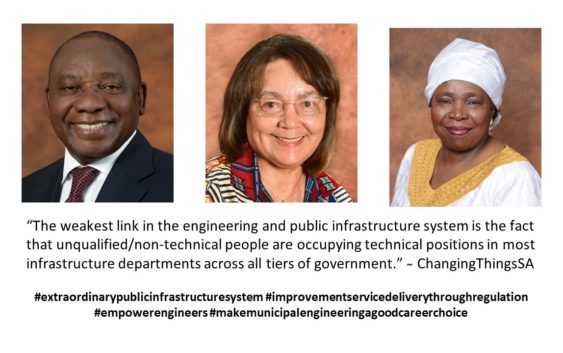- MPILO HOSPITAL IN NEEDS OF MASSIVE INFRASTRUCTURAL CHANGE IN ZIMBABWE
- HOW MDCB BAIL OUT BOSTWANA MINERGY OVER LOST OF COAL PRODUCTION
- WHY ACCESS TO WATER IS STILL A MAJOR ISSUE IN AFRICA
- PRE DEVELOPMENT SET TO UNHELD PROMISE OF HADABA PROJECT DESPITE SEVERAL SETBACK IN EGYPT
- WHY MOROCCO WANT TO CUT ENERGY DEPENDENCE FROM SPAIN
THE WEAKEST LINK IN IMPLEMENTING NDP2030 INFRASTRUCTURE

The weakest link in the engineering and public infrastructure system is the fact that unqualified/non-technical people are occupying technical positions in most infrastructure departments across all tiers of government.
The prioritisation of infrastructure must be supported by an extraordinary public infrastructure system with suitably qualified, professionally registered technical staff appointed by all organs of state; thus ensuring that public tenders, among other, will be compiled and adjudicated, and contracts are managed by professionally registered personnel. This should not be limited to Director-General, Deputy Director-General, Chief Director and Director-positions in case of national departments, or equivalent positions in the provincial departments, municipalities and State-owned entities.
Positions need to be regulated to be filled ONLY by suitably qualified, registered engineers. This will create a conducive environment for infrastructure to be developed by these government departments, which could then be completed successfully on time and within budget. Perhaps this could be done through the Infrastructure Development Act 23 of 2014 or Municipal Systems Act or Public Administration Management Act.
Engineers must also be empowered with decision-making powers. Furthermore, their recommendations should be binding. Currently the political, SCM and legal tend to overrule engineering decisions that should be implemented for the success of projects and benefit to society. Only engineers CAN make engineering decisions. Engineers don’t make medical or legal decisions: so why interference by politicians and others?
The five-year contract for, for example, technical services managers tend to work against sustainable technical capacity building in a municipality. Perhaps, it must be extended to seven years, the same as that of the Public Protector, but desirably removed completely to enable engineers (preferably from the same local or district municipality) to take the position as a lifelong career, the same as it is done in the private sector.
Author: Changing Things SA, Marie Ashpole

